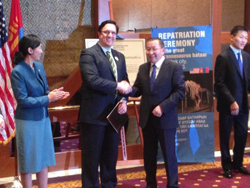T. rex suit takes Texas lawyer to NYC and Mongolia

Robert Painter accepts a medal from
Mongolian president Tsakhiagiin Elbegdorj.
Image from Robert Painter.
A victory in civil and criminal litigation over the New York City auction of a smuggled Tyrannosaurus rex skeleton last year hasn’t just earned legal fees for Texas attorney Robert Painter.
It’s taken him to Mongolia, where evidence was collected in the Gobi desert, and from his Houston law office to a Dallas judge’s home, on a Saturday morning, where Painter filed an emergency civil suit and obtained an ex parte temporary restraining order, he tells the ABA Journal. The company conducting the auction was based there, so the Texas court had jurisdiction.
“To me, that was the hardest part of the whole case, getting a judge on the weekend,” said Painter, explaining that he’d been put in touch by friends of the judge after he reached out to contacts in Dallas.
Texas law provides for judges to accept filings and permits ex parte TROs, Painter said. But a bond requirement had to be finessed, because the court clerk’s office wouldn’t be open to accept it until Monday. The judge went ahead and issued the order banning the auction, based on Painter’s promise to put up the bond on the next business day.
The TRO still had to be served on the auction company, on Sunday, in the few hours remaining before the sale was conducted, which would not have been allowed in Texas. But New York law permitted Sunday service, so Painter transmitted a copy to a process server there and had him serve the TRO on auction company officials in the Big Apple.
Although the auction company initially went ahead and sold the smuggled Mongolian fossil for a little over $1 million, in spite of the TRO, the tide soon began to turn. Painter had also gone to New York himself and attended the May 2012 auction with a professional photographer, publicly objected to the sale and then videotaped it as it proceeded.
This helped spark extensive news coverage, which resulted in two phone calls as Painter was returning to Texas, expecting to seek a contempt order, he recounts. The first was from the buyer, who said he no longer wanted any part of the transaction and would cooperate fully. The second was from the U.S. Attorney’s office in Manhattan, which offered its help in seeking the forfeiture of the Tyrannosaurus skeleton.
Gladly allowing the feds to take the lead, Painter continued in the case from that point forward as a coordinator working to provide the laws, evidence and experts needed by the prosecutors on behalf of his client, the Mongolian government.
At one point, when it turned out that an individual suspected of smuggling the skeleton to the U.S. was staying in the same hotel as a team of experts brought in to inspect it, during the forfeiture proceeding, someone snapped a photo of the suspect. When the photo was taken to Mongolia, someone there recognized him and provided additional photos of the suspect digging for dinosaurs in the Gobi desert, Painter says.
There was a ceremony in New York earlier this month, at which his client thanked the U.S. Attorney’s office for its work, as a U.S. Immigration and Customs Enforcement press release details.
Meanwhile, Painter was awarded Mongolia’s top civilian honor, the Order of the Polar Star, for his help getting the massive, 70-million-year-old fossil returned to its home country, reports the Houston Chronicle.
In an email to the newspaper, Painter said it was a great honor to receive the award from Mongolia’s president for his work on a fascinating case.
“Just a year ago, we started out to stop the sale of one smuggled Tyrannosaurus skeleton,” he wrote. “We ended up uncovering the largest dinosaur smuggling ring ever discovered, and have helped to return over 30 significant dinosaur fossils to the people of Mongolia.”
The skeleton is being returned to Mongolia, where it will soon be displayed in a museum–along with legal documents in the case, including the TRO, Painter tells the ABA Journal.
“As a lawyer, it’s gratifying not only to help a wonderful group of people, the Mongolians, but also to see that we could do a little bit to spread the word about our wonderful judicial system:”
Write a letter to the editor, share a story tip or update, or report an error.


